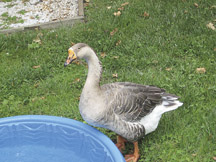Many people have watchdogs, canines raised from birth that guard both family and hearth. Secaucus resident Nancy Doyle may have the first “watch goose.”
Chatter, the 30-year-old Toulouse goose who has lived with the Doyle family since she was a gosling, has long guarded their homestead on Mill Ridge Road.
“When she hears an unfamiliar voice, she honks,” Doyle said, alerting the family that a stranger is nearby.
The story of how a farm-born goose came to live in suburban Secaucus may seem strange and exotic on its surface, but is actually rooted in the age-old tale of a child’s love for a favorite pet.
“Honk, honk, honk.” – Chatter, the Toulouse goose
________
Doyle’s father, who lived in Secaucus, was so moved by Rebecca’s affection for Chatter that he finally agreed to “adopt” her and house her in his backyard. Chatter soon become a feathered companion to the homing pigeons he already owned.
“She really has been a wonderful presence,” Doyle, Chatter’s primary caretaker now, said last week. “She’s very calm and has a terrific temperament. I’ve never regretted adopting her. She has been a member of the family for so long, it’s hard to imagine life without her. I can always count on a vocal response from her when I go to [my] back window and say, ‘Chatter?’ She answers with a ‘honk, honk, honk’ that’s much different from the loud warning honks she belts out when strangers are [near].”
Edible eggs
Aside from being the family watch goose, Chatter has earned her keep in other ways, too. For about 25 years she laid between 12 and 15 eggs every spring – and yes, the eggs were edible! “They were great as an ingredient in rich golden pound cakes,” Doyle said. “One goose egg is [the] equivalent to four or five chicken eggs.”
Now that she’s entering the latter years of her life, Chatter no longer lays eggs.
Chatter could never fly, so she passes her days sunning herself in the backyard, taking periodic dips in the kiddie pool Doyle has set up for her, and running through the garden sprinkler.
“Each morning I open the door to her coop, she comes to the open door, I lift her out and place her in [the] kiddie pool,” Doyle said, explaining Chatter’s daily routine. “She swims in circles for about a half hour, gets herself out, explores the yard, eats grass, and honks at passers-by.”
Dinnertime is at dusk, which she takes in her coop. Doyle treats her to dandelion greens, leaf lettuce, corn on the cob, and grain.
Graying goose
Although Chatter could see for most of her life, she is now blind due to cataracts, though it’s hard for a stranger to tell.
“I can see the difference now,” Doyle noted. “She moves differently now than she did before. She never used to go in circles in the pool. I think she does that now that she can’t see. But she knows the yard so well that she can still get around and explore like she always has.”
It’s rare that a Toulouse goose lives to see its thirtieth birthday. The Audubon Society and various wildlife centers, bird sanctuaries, and poultry hatcheries have been unable to give Doyle the average age of Toulouse geese when they die, but no one has ever heard of one living 30 years.
She said, “most seem to die by age 20… Needless to say, Chatter enjoys a life of Reilly. It could be that she’s reached 30 as the result of lots of love and TLC.”
E-mail E. Assata Wright at awright@hudsonreporter.com.
